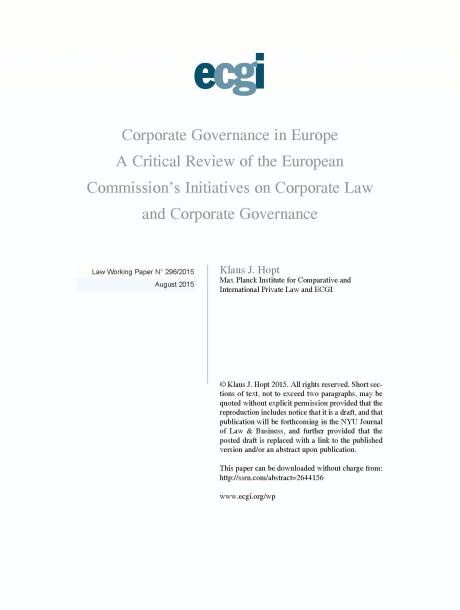
Corporate Governance in Europe: A Critical Review of the European Commission?s Initiatives on Corporate Law and Corporate Governance
Abstract
European corporate law and corporate governance are moving ahead beyond expectation. Some British voices called this ?a renaissance in the past decade?. In December 2012, the European Commission came forward with an Action Plan that combines both corporate law and corporate governance rules and contains sixteen disparate initiatives partly to be implemented through Directives, partly through non-legal measures. Meanwhile a fight on the Draft Shareholder Rights Directive is going on in the European Council and the Parliament, with major compromises pending in 2015. Further corporate law harmonization measures are under way, in particular the proposal of Single-Member Private Limited Companies. The European Court of Justice?s case law has a far-reaching impact on the free movement of corporations in the European Union, but is not able to singlehandedly create European corporate law with decisions based on the freedoms of the Treaty. On this background the article analyzes seven critical areas of European Corporate Law and Governance as of 2015: Empowering shareholders and institutional investors; controlling shareholders, groups of companies and related party transactions; new European corporate forms; corporate and bank governance; free transfer of seat without new incorporation; corporate finance and capital maintenance and European takeover law reform. The article ends with looking into the goals, methods and scope of European corporate law-making. Free mobility and minimum protection have to be balanced. Transparency as a method of regulation strengthens private autonomy and supports market forces. Harmonization must be limited to the core areas of corporate law, and national and European corporate law will need to complement one another. It remains to be seen whether the codification plans of the Commission and the private model law initiatives will produce convincing results. In sum any step to more European law in the before-mentioned core areas should not only be left to the forces or deadlocks of political compromise, but in order to be really useful will need to be addressed in a careful, ongoing, policy-oriented, economic and comparative law discussion.




